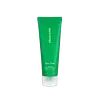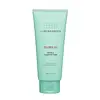What's inside
What's inside
 Key Ingredients
Key Ingredients

 Benefits
Benefits

 Concerns
Concerns

 Ingredients Side-by-side
Ingredients Side-by-side

Water
Skin ConditioningGlycerin
HumectantPalmitic Acid
EmollientStearic Acid
CleansingLauric Acid
CleansingMyristic Acid
CleansingPotassium Hydroxide
BufferingGlyceryl Stearate Se
EmulsifyingPropylene Glycol
HumectantBeeswax
Emulsion StabilisingCocamidopropyl Betaine
CleansingGlycol Distearate
EmollientPEG-60 Hydrogenated Castor Oil
EmulsifyingSalicylic Acid
MaskingEthyl Hexanediol
SolventSodium Chloride
MaskingGlyceryl Caprylate
EmollientMelaleuca Alternifolia Leaf Oil
AntioxidantTocopheryl Acetate
AntioxidantAlcohol
AntimicrobialDisodium EDTA
BHT
AntioxidantGlycyrrhiza Glabra Root Extract
BleachingCentella Asiatica Extract
CleansingCalendula Officinalis Flower Extract
MaskingMelaleuca Alternifolia Leaf Water
AntimicrobialHamamelis Virginiana Extract
AntiseborrhoeicSophora Angustifolia Root Extract
Skin ConditioningButylene Glycol
HumectantEucalyptus Globulus Leaf Extract
Perfuming1,2-Hexanediol
Skin ConditioningWater, Glycerin, Palmitic Acid, Stearic Acid, Lauric Acid, Myristic Acid, Potassium Hydroxide, Glyceryl Stearate Se, Propylene Glycol, Beeswax, Cocamidopropyl Betaine, Glycol Distearate, PEG-60 Hydrogenated Castor Oil, Salicylic Acid, Ethyl Hexanediol, Sodium Chloride, Glyceryl Caprylate, Melaleuca Alternifolia Leaf Oil, Tocopheryl Acetate, Alcohol, Disodium EDTA, BHT, Glycyrrhiza Glabra Root Extract, Centella Asiatica Extract, Calendula Officinalis Flower Extract, Melaleuca Alternifolia Leaf Water, Hamamelis Virginiana Extract, Sophora Angustifolia Root Extract, Butylene Glycol, Eucalyptus Globulus Leaf Extract, 1,2-Hexanediol
Water
Skin ConditioningMyristic Acid
CleansingGlycerin
HumectantMethylpropanediol
SolventPotassium Hydroxide
BufferingCoco-Glucoside
CleansingLauric Acid
CleansingPalmitic Acid
EmollientStearic Acid
CleansingMelaleuca Alternifolia Leaf Extract
PerfumingSalicylic Acid
MaskingGlyceryl Stearate
EmollientMelaleuca Alternifolia Flower/Leaf/Stem Extract
Skin ConditioningMelaleuca Alternifolia Leaf Water
AntimicrobialMelaleuca Alternifolia Leaf Oil
AntioxidantCentella Asiatica Extract
CleansingSorbitan Olivate
EmulsifyingPanthenol
Skin ConditioningBeta-Glucan
Skin ConditioningSodium Phytate
1,2-Hexanediol
Skin ConditioningWater, Myristic Acid, Glycerin, Methylpropanediol, Potassium Hydroxide, Coco-Glucoside, Lauric Acid, Palmitic Acid, Stearic Acid, Melaleuca Alternifolia Leaf Extract, Salicylic Acid, Glyceryl Stearate, Melaleuca Alternifolia Flower/Leaf/Stem Extract, Melaleuca Alternifolia Leaf Water, Melaleuca Alternifolia Leaf Oil, Centella Asiatica Extract, Sorbitan Olivate, Panthenol, Beta-Glucan, Sodium Phytate, 1,2-Hexanediol
Ingredients Explained
These ingredients are found in both products.
Ingredients higher up in an ingredient list are typically present in a larger amount.
1,2-Hexanediol is a synthetic liquid and another multi-functional powerhouse.
It is a:
- Humectant, drawing moisture into the skin
- Emollient, helping to soften skin
- Solvent, dispersing and stabilizing formulas
- Preservative booster, enhancing the antimicrobial activity of other preservatives
Centella Asiatica Extract (Centella) is derived from an herb native to Southeast Asia. It is famous for its anti-inflammatory and soothing properties.
Centella is rich in antioxidants and amino acids, such as Madecassic Acid and Asiaticoside.
Studies show the compounds in centella help with:
The combination of all these properties makes centella effective at soothing, hydrating, and protecting the skin.
Other great components of centella include Vitamin A, vitamin C, several B vitamins, and Asiatic Acid.
Fun fact: Centella has been used as a medicine and in food for many centuries. As a medicine, it is used to treat burns, scratches, and wounds.
Learn more about Centella Asiatica ExtractGlycerin is already naturally found in your skin. It helps moisturize and protect your skin.
A study from 2016 found glycerin to be more effective as a humectant than AHAs and hyaluronic acid.
As a humectant, it helps the skin stay hydrated by pulling moisture to your skin. The low molecular weight of glycerin allows it to pull moisture into the deeper layers of your skin.
Hydrated skin improves your skin barrier; Your skin barrier helps protect against irritants and bacteria.
Glycerin has also been found to have antimicrobial and antiviral properties. Due to these properties, glycerin is often used in wound and burn treatments.
In cosmetics, glycerin is usually derived from plants such as soybean or palm. However, it can also be sourced from animals, such as tallow or animal fat.
This ingredient is organic, colorless, odorless, and non-toxic.
Glycerin is the name for this ingredient in American English. British English uses Glycerol/Glycerine.
Learn more about GlycerinLauric Acid is a fatty acid or lipid. About half of fatty acids in coconut oil is lauric acid.
This ingredient helps hydrate and sooth skin. As a humectant, it helps trap moisture. It also aids in cleaning and enhancing the texture of products.
Lauric acid may not be Malassezia folliculitis, or fungal acne, safe.
Learn more about Lauric AcidThis tea tree oil comes from the leaves of the Tea Tree plant. Tea tree oil has antioxidant, anti-inflammatory, and antimicrobial properties.
According to the book Journal of Profiles of Drug Substances, tea tree helps in reducing acne-causing bacteria such as Propionibacterium acnes. This is due to the Terpinen components of tea tree oil.
Tea tree may cause sensitivity and irritation for some people. This oil naturally contains fragrance such as linalool and limonene.
However, research shows irritation usually occurs when using pure tea tree oil and not in cosmetic products.
Tea tree oil was found to help relieve the symptoms of psoriasis in one study.
Tea tree oil is toxic when ingested. Another study showed it to caused damage to the nervous system of dogs and cats when applied to their skin or given orally.
Learn more about Melaleuca Alternifolia Leaf OilThis ingredient is created by distilling parts of the tea tree plant. The bark and leaves of the tea tree plant are rich in Terpinen, an antioxidant, antibacterial, and anti-inflammatory ingredient.
Tea tree may cause sensitivity and irritation for some people due to its linalool and limonene content.
Learn more about tea tree benefits here.
Learn more about Melaleuca Alternifolia Leaf WaterMyristic Acid is a saturated fatty acid. It is naturally found in milk fat. Other sources include palm oil, coconut oil, and butter fat.
Myristic Acid is an emulsifer and cleanser. As an emulsifer, it stabilizes a product by preventing ingredients from separating. Myristic Acid helps clean your skin by acting as a surfactant. It tends to gather oil and dirt on your skin to be easily rinsed away.
One study from 2021 found Myristic Acid to have anti-inflammatory properties.
Learn more about Myristic AcidPalmitic Acid is a fatty acid naturally found in our skin and in many plant and animal sources. In cosmetics, it is usually derived from palm oil. It serves many purposes in skincare, acting as a cleanser, emollient, and emulsifier.
As an emollient, palmitic acid helps soften and smooth the skin by preventing water loss. In cleansers, it helps remove oil and dirt while creating foam.
Its emulsifying properties help stabilize products by keeping water and oil-based ingredients from separating.
This may not be suitable for fungal acne-prone skin, as fatty acids like this can sometimes trigger breakouts in sensitive individuals.
Learn more about Palmitic AcidPotassium hydroxide is commonly known as caustic potash. It is used to fix the pH of a product or as a cleaning agent in soap. In cleansers, it is used for the saponification of oils.
Sapnification is the process of creating fatty acid metal salts from triglycerides and a strong base. During this process, Potassium Hydroxide is used up and is not present in the final product.
Using high concentrations of Potassium Hydroxide have shown to irritate the skin.
Learn more about Potassium HydroxideSalicylic Acid (also known as beta hydroxy acid or BHA) is a well-known ingredient for treating skin that struggles with acne and clogged pores. It exfoliates both the skin's surface and deep within the pores to help clear out buildup, control oil, and reduce inflammation.
Unlike AHAs (alpha hydroxy acids), salicylic acid is oil-soluble. This allows it to penetrate into pores which makes it especially effective for treating blackheads and preventing future breakouts.
Salicylic acid is also known for its soothing properties. It has a similar structure to aspirin and can calm inflamed or irritated skin, making it a good option for acne-prone skin that is also sensitive.
Concentrations of 0.5-2% are recognized by the U.S. FDA as an over-the-counter topical acne product.
It can cause irritation and/or dryness if one's skin already has a compromised moisture barrier, so it's best to focus on repairing that before introducing this ingredient into your routine.
While salicylic acid does not increase sun sensitivity, it’s still important to wear sunscreen daily to protect your skin.
If you are looking for the ingredient called BHA or Butylated Hydroxyanisole, click here.
Learn more about Salicylic AcidStearic Acid is a fatty acid. It is an emollient, emulsifier, and texture enhancer.
As an emollient, stearic acid helps soften skin. It aids the skin's protective barrier by preventing water loss. It also provides a gentle cleansing effect without stripping away natural oils.
Stearic acid may also be used to enhance the texture of products. It can add volume and stabilize ingredients such as water and oil. This can help water and oil ingredients from separating.
Sources of stearic acid include animal or vegetable fats/oils such as coconut or shea. It can be naturally found in butter, cocoa butter, shea butter, vegetable fats, and animal tallow.
This ingredient may not be Malassezia folliculitis, or fungal-acne safe.
Learn more about Stearic AcidWater. It's the most common cosmetic ingredient of all. You'll usually see it at the top of ingredient lists, meaning that it makes up the largest part of the product.
So why is it so popular? Water most often acts as a solvent - this means that it helps dissolve other ingredients into the formulation.
You'll also recognize water as that liquid we all need to stay alive. If you see this, drink a glass of water. Stay hydrated!
Learn more about Water